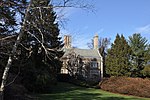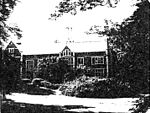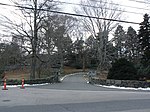1999 Ryder Cup
The 33rd Ryder Cup, also known as the "Battle of Brookline", was held September 24–26, 1999, in the United States at The Country Club in Brookline, Massachusetts, a suburb southwest of Boston. The American team won the competition by a margin of 141⁄2 to 131⁄2, The Europeans, leading 10–6 heading into the final round, needed only 4 points on the final day to retain the cup. The Americans rallied on the Sunday, winning the first 6 matches of the day to surge into the lead. Further wins by Steve Pate and Jim Furyk took them into a 14–12 lead. The Americans recaptured the Ryder Cup when Justin Leonard halved his match with José María Olazábal. With the match all-square Leonard holed a 45-foot birdie putt on the 17th hole. After controversial premature celebrations on the green, Olazabal then missed his 22-foot birdie putt to leave Leonard one up with just one hole to play, assuring him of a half point and guaranteeing an American victory. The behavior of both U.S. spectators and the U.S. team was criticized by both American and European media. U.S. spectators raucously heckled and abused European players. Allegations were also made regarding cheating on the part of course marshals. Notoriously, the U.S. team raucously invaded the 17th green after Leonard had holed his long putt but before Olazábal had attempted his shorter putt. The incident was viewed by many in both the US and Europe as appalling sportsmanship. Veteran broadcaster Alistair Cooke described the last day of the tournament as "a date that will live in infamy" in a Letter from America entitled "The arrival of the golf hooligan".At the time, the American win was the largest final day come-from-behind victory in Ryder Cup history; Europe achieved the same feat in 2012. It is still widely regarded as one of the most impressive come-from-behind victories in recent sports history.This was one of the last public appearances of Payne Stewart, who died in a plane crash less than a month later.
Excerpt from the Wikipedia article 1999 Ryder Cup (License: CC BY-SA 3.0, Authors).1999 Ryder Cup
Clyde Street,
Geographical coordinates (GPS) Address Phone number Website Nearby Places Show on map
Geographical coordinates (GPS)
| Latitude | Longitude |
|---|---|
| N 42.315 ° | E -71.148 ° |
Address
The Country Club
Clyde Street 191
02467
Massachusetts, United States
Open on Google Maps







